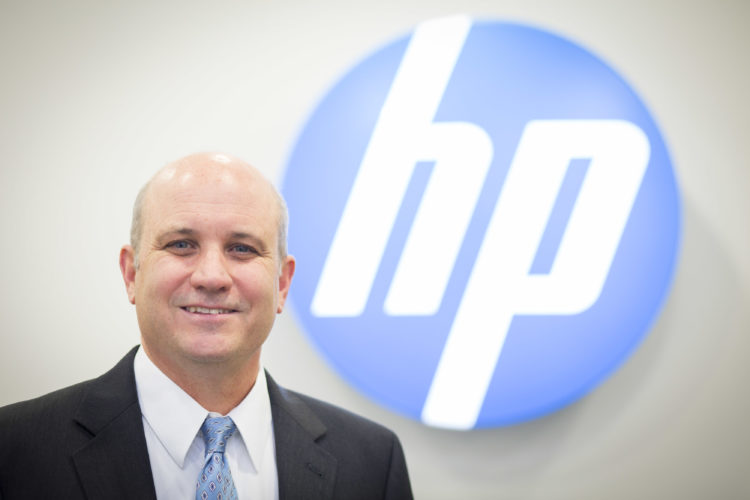HP aspires to sustainable development in IT
The future is digital, but can also be green

Sign up for breaking news, reviews, opinion, top tech deals, and more.
You are now subscribed
Your newsletter sign-up was successful
HP has built its reputation on manufacturing a whole wide range of printers, from inkjet printers to laser printers to all-in-one printers and even 3D printers. Now the company wants to turn its attention to sustainable development.
Commitments from corporates and brands to address the climate emergency are not new. But change is afoot. Industry is taking action that goes beyond merely ensuring their operations are zero impact on the planet – instead, protecting, restoring and improving the planet is the gold standard IT decision makers are now calling for. As an industry leader, HP is driving action to inspire other IT manufacturers and suppliers to strive for this too.
George Brasher is the UK Managing Director at HP.
Forests are the future
Trees are the world’s best carbon sequestering technology. Yet nearly half of all global forests are under threat of deforestation and forest degradation – being destroyed at the pace of one football pitch per minute. This is compounding the climate emergency, as well as endangering all the living things that depend on these ecosystems for survival.
Protecting, restoring and improving the management of forests is part of the answer. By doing so, we stand to remove between five and seven billion metric tons of CO2. To put those figures into perspective, we stand to make the same impact as we would if we eliminated emissions from all the cars in the world today.
But how can we achieve this? Industry should not operate in a silo. Cooperation and collaboration with sustainable impact experts, such as the World Wildlife Fund (WWF), is essential. This is why HP has partnered with WWF to launch the HP Sustainable Forests Cooperative. Starting with an area of forest equivalent to the size of New York City (nearly 200,000 acres), we have committed to protecting, restoring and improving the management of forest ecosystems.
As the world’s leading manufacturer of printers for home and office, we understand the importance of our role. Our goal is to make printing with HP directly responsible for the increase in Forest Stewardship Council (FSC) and recycled fibre sourcing.
But beyond this, our initiative considers the entire forest ecosystem. After all, a forest is greater than the sum of trees; they are living organisms with flora, fauna, soils and water sources. Engaging with the WWF, we are working together on a holistic approach that takes all of these component parts into account – to be forest positive.
Sign up to the TechRadar Pro newsletter to get all the top news, opinion, features and guidance your business needs to succeed!
Economic models are the engine of change
Creating a forest positive future for printing is only the beginning as it is at the start of the supply chain – and our commitment to sustainable impact is at the core of all we do. However, in the UK, our current economic model is not compatible with this. As an industry, we must embrace the circular economy at each stage of the supply chain to make the means of production and operation as efficient as possible.
But how does it work? This economic model revolves around recovering and recycling resources and using them for as long as possible – then regenerating them again to give them a new lease of life rather than sending them to landfill. By embracing the circular economy, our outputs can be sustainable by design, and throughout their entire lifecycle.
Already, the circular economy is acting as an engine of change and the consequences are clear. IT management, manufacturers and suppliers, including HP, are opting for recycled plastic over virgin plastic. Last year, we incorporated more than 21,000 tonnes of recycled plastic in our products, accounting for seven percent of the overall content. And this is only the start. Recently, we made the commitment to increase our use of recycled plastic to 30 percent by 2025.
This year, we unveiled the world’s first PC made with ocean-bound plastics – the HP Elite Dragonfly. It is now one of three products made this way and to ensure our ocean-bound plastics efforts continue to scale, we have committed to including ocean-bound plastic material in all new HP Elite and HP Pro desktop and laptop computers launching in 2020.
Looking at the bigger picture, the circular economy could create £3.71 trillion in additional economic output in the UK by 2030 according to Accenture. UK government is backing this shift to a more sustainable system too. In 2018, the Department for Environment, Food & Rural Affairs (DEFRA) and the Environment Agency (EA) published a strategy for England on waste and resources calling specifically for this.
Sustainability delivers revenue growth
Beyond being the right thing to do, prioritising sustainability pays. We have seen this happen first-hand in our business. Our 2018 Sustainable Impact Report revealed a 35 percent year-on-year increase in deals where sustainability was a requirement – resulting in revenue growth, with an additional £745 million in new revenue won.
Sustainability matters to today’s IT decision makers. Millennials have been rising up the ranks and are now in positions of power professionally – with 73 percent of millennials involved in purchasing decisions of their companies, according to Forrester.
For millennials, sustainability is important. According to Neilsen, 83 percent of millennials indicated it is important for companies to implement environmental programmes, and 75 percent said they would change their purchasing habits to reduce their environmental impact. What’s more, 66 percent of consumers said they would spend more with a brand they perceived to be sustainable than with a less environmentally conscious competitor.
Millennials do not abandon their ideals and principles in the office suite – they do not distinguish between consumer and business IT. They value authentic, lasting relationships and care beyond cost when it comes to IT procurement – corporate reputation is key. If they do believe a company is meeting the sustainability standards they expect, they will wield their purchasing power accordingly.
The time to change is upon us
It is undeniable: the climate emergency is one of the most critical issues facing the planet. The time to change is upon us, and we must act now to protect our ecosystems for future generations. As we approach 2020, the urgency is ever more pressing. As a result, IT decision makers are expecting higher standards than ever before.
Throughout the supply chain preserving and improving our environment – ultimately, addressing the climate emergency – should be a priority. Especially as it is so good for business, there is an incentive for those within the industry who are behind the curve to keep up. By being forest positive and championing the circular economy, we are driving action to inspire others to strive to the gold standard of going beyond being zero impact on the planet – protecting, restoring and improving the planet instead.
George Brasher is the Managing Director at HP UK.
George Brasher is the UK Managing Director at HP. He has over 25 years of working experience. . He is thoughtful, creative and steady handed. Despite the challenges, George has always displayed a willingness to understand all possible options to deliver the best outcome
